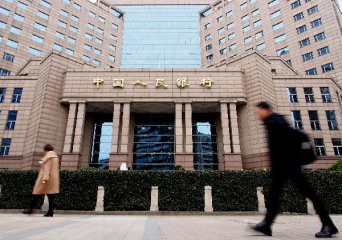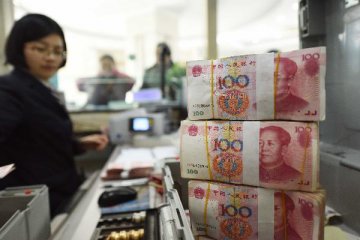China's central bank continued to pump liquidity into the money market through reverse repos on Monday.
The People's Bank of China (PBOC) conducted 20 billion yuan (about 2.9 billion U.S. dollars) of 14-day reverse repos at 2.7 percent.
The move came after the PBOC conducted 30 billion yuan of seven-day reverse repos at an interest rate of 2.55 percent and 20 billion yuan of 14-day reverse repos at 2.7 percent on Friday.
The PBOC said in a statement that the latest liquidity injection is made to offset impact of government bond issuance and payment to keep liquidity at reasonable and abundant level.
Last week has seen a combined net injection of 600 billion yuan via the PBOC's open market operations, the largest weekly amount in 11 months.
China will strengthen counter-cyclical adjustments in its macro policy, continue to implement the proactive fiscal policy and the prudent monetary policy, make pre-emptive adjustments and fine-tune policies at the proper times, and ensure stable aggregate demand, according to the annual Central Economic Work Conference concluded last week.
Through reverse repos, the central bank purchases securities from commercial banks through bidding, with an agreement to sell them back in the future.
The People's Bank of China (PBOC) conducted 20 billion yuan (about 2.9 billion U.S. dollars) of 14-day reverse repos at 2.7 percent.
The move came after the PBOC conducted 30 billion yuan of seven-day reverse repos at an interest rate of 2.55 percent and 20 billion yuan of 14-day reverse repos at 2.7 percent on Friday.
The PBOC said in a statement that the latest liquidity injection is made to offset impact of government bond issuance and payment to keep liquidity at reasonable and abundant level.
Last week has seen a combined net injection of 600 billion yuan via the PBOC's open market operations, the largest weekly amount in 11 months.
China will strengthen counter-cyclical adjustments in its macro policy, continue to implement the proactive fiscal policy and the prudent monetary policy, make pre-emptive adjustments and fine-tune policies at the proper times, and ensure stable aggregate demand, according to the annual Central Economic Work Conference concluded last week.
Through reverse repos, the central bank purchases securities from commercial banks through bidding, with an agreement to sell them back in the future.





















Latest comments